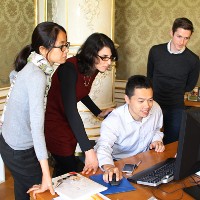IIASA Postdoctoral Scholars 2014
Working within IIASA’s own research programs, postdoctoral fellows pursued a wide range of studies on human-environment interactions, game theory, governance, and systems analytical tool development.
Funding is provided by a variety of sources. During 2014, five researchers were funded by IIASA, two funded by the Kempe Foundation, and one as a Colosio Fellow.
Short outlines of the work of the postdoctoral scholars can be found below. The information is provided to give an idea of the contribution made by postdoctoral research in 2014 to the Institute's overall work. Note, however, that the research is ongoing and may be subject to revision.
Behavioral equilibrium for infinitely repeated games
Artem Baklanov of the Advanced Systems Analysis Program is analyzing iterated social dilemmas that will help reveal features of stability of interactions, thereby helping individuals learn, though interaction, how to cope with behavioral uncertainty, understand the interests of other individuals, and better adapt to changing social environments. More
Modeling mechanisms influencing above- and below-ground diversity and productivity in plant communities
Gergely Boza of the Evolution and Ecology Program is researching best plant investment strategy, or best cultivar, with the optimal balance between investment in allelochemical production and growth, in combination with different agricultural techniques such as monocropping, rotational cropping, or alternate cropping. More
Global modeling of wood biomass supply costs in G4M and GLOBIOM
Fulvio Di Fulvio is working in the Ecosystems Services and Management Program using IIASA’s GLOBIOM and G4M models for a project designed to produce a harmonized approach to the modeling of wood production and delivery costs in the light of increasing competition for wood biomass between material and energy uses in recent years. More
Abstract algebraic tools for systems analysis
Daniel Jessie of the Advanced Systems Analysis Program is working to introduce a different mathematical approach to understanding the nature of dynamical network processes where standard mathematical tools can only provide analytical solutions in simplest cases. More
Modeling soil carbon and nitrogen cycling based on microbial ecology
Christina Kaiser is working in the Evolution and Ecology Program using a computer model that she developed and tested herself which simulates decomposing litter or soil at microbial-relevant scales to understand mechanisms emerging from complex microbial interactions at the microscale. More
Stability and complexity of adaptive ecological networks
Pietro Landi of the Evolution and Ecology Program is studying animal movement behavior and the sustainable management of fisheries to assess the adaptive behavior of single individuals in ecosystems and societies. More
Natural disaster and social-ecological transitions
Wei Liu is working with the Risk, Policy and Vulnerability Program on human-environment relationships. He is studying the specific case of the Wolong Nature Reserve in Sichuan Province, China, where in May 2008 the local community’s economic, energy, and land use/cover transitions were devastated by a megadisaster, the 7.9 Mw Wenchuan earthquake, which caused massive damage and mortalities. More
Comparative approaches to the environmental governance of transboundary water resources between the United States and Mexico: The cases of the Rio Grande/Río Bravo Basin and the Colorado River Basin
Luzma Fabiola Nava Jiménez is working with the Water Program, researching the transboundary governance regime in the binational US/Mexico Rio Grande/Rio Bravo Basin to assess the institutional and organizational arrangements for water management and conservation, and thereby define a broader framework to compare different scenarios of transboundary water governance. More
Improving the efficiency of citizen science for land-cover mapping applications
Carl Salk is working with the Ecosystems Services and Management (ESM) Program assessing the quality of the work of volunteers—as opposed to the “gold standard” of experts—who are carrying out image classification for IIASA’s “Cropland Capture,” when they are faced with tasks of non-uniform difficulty and, in particular, of extreme difficulty. He is already applying insights to a new game under development. More
The interplay between the formation of cooperative groups and the evolution of cooperation
Henrik Sjödin is working within the Evolution and Ecology Program studying the emergence of group structures resulting from migration behaviors in large communities and their resulting effects on cooperation. More
Dynamics in large, complex networks
Matthias Wildemeersch is working in the Advanced Systems Analysis and Ecosystems Services and Management Program on the dynamical behavior of large-scale networks with the aim of strategies to improve network robustness. More
Further information













